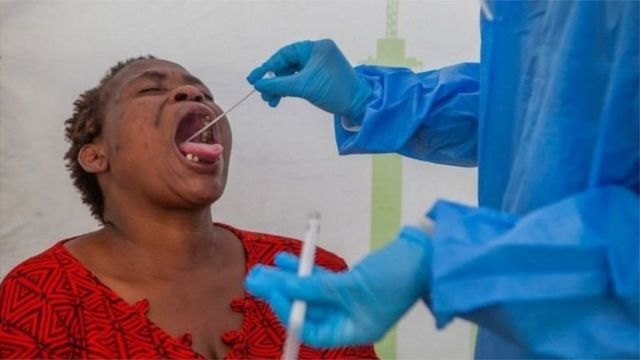One year after Nigeria recorded its first COVID-19 index case, the country has not been able to meet its testing target.
On February 27, 2020, Nigeria’s first index case of COVID-19 was confirmed in Lagos. This was the first reported case in Sub-Saharan Africa. An Italian, who had just returned from Milan, Italy on the 25th of February 2020, was confirmed by the Virology Laboratory of the Lagos University Teaching Hospital (LUTH), and managed at the Infectious Disease Hospital (IDH) in Yaba, Lagos.
Exactly one year after, more than 155,000 have been infected with the virus in the country and over 1900 deaths confirmed in the 36 states and the Federal Capital Territory.
The coronavirus disease 2019 (COVID-19) is a communicable respiratory disease caused by a new strain of coronavirus that causes illness in humans. It was first reported in December 2019 in Wuhan, China, and in January 2020, the World Health Organisation (WHO) declared COVID-19 to be a public health emergency of international concern. it has now spread to over 200 million people over the world.
Nigeria’s initial response to the pandemic was slow until the number of infections was around 30. On March 11, 2020, the government finally restricted entry into the country for travellers from China, Italy, Iran, South Korea, Spain, Japan, France, Germany, U.S., Norway, UK, Switzerland, and the Netherlands.
Two days later, it announced that the two main international airports in Lagos and Abuja would close for one month. After much persuasion and complaints from experts, President Muhammadu Buhari, on March 29, imposed a lockdown in Lagos, the FCT, and Ogun states while lockdown measures such as curfew, banning of interstate travels, social activities e.t.c were imposed in other states in the country.
The lockdown was further extended and in May 2020 when it was partially lifted due to the impact of the pandemic on the economy, Nigerians begin to care less.
Low testing
The country has not been doing so well when it comes to sample testing. Initially, there were only three molecular laboratories in the country with the capacity to test samples and diagnose COVID-19. Two of the labs were located in Lagos, at the LUTH and IDH, and the third in Ede, Osun State. Now, there are well over 100 accredited public and private laboratories and the country has tested 1,489,103 samples so far.
In April 2020, the NCDC announced its target of testing at least two million people within the next three months. Almost a year later, Nigeria is yet to conduct two million tests.
In August, The Chairman of the PTF, Boss Mustapha, explained that whereas Nigeria now has the infrastructure to test up to 15,000 per day, the daily records show 3,000 and 6,000 were done around that time.
“Our testing infrastructure has been increased to undertake up to 15,000 tests per day but we are currently testing between 3,000 to 6,000 daily due mainly to people still not subjecting themselves to testing. I, therefore, want to seize this opportunity to enjoin Nigerians to get tested,” he said.
Yet, the country has not been able to meet up the testing target it set.
High discharge rate, low deaths
Over 133,000 Nigerians have recovered from the virus and currently, there are less than 25,000 active cases in various isolation centres across the country.
The good news is that several vaccines to prevent and protect people from the virus have been produced. Globally, The first mass vaccination programme started in early December 2020 and as of 15 February 2021, 175.3 million vaccine doses have been administered. At least seven different vaccines (three platforms) have been administered worldwide.
Also, over 1,900 deaths have been recorded in Nigeria which is less than two per cent of those infected.
Some Nigerians have not been complying with the safety protocols such as the practice of social distancing and gatherings, wearing of face masks, hand washing and cleaning routines and so on, and as a result of this, the country entered into the second wave of the pandemic in December 2020.
To mark one year since the first case was reported in Nigeria, the NCDC Director-General, Dr Chikwe Ihekweazu, emphasised the need for continued solidarity and adherence to public health and social measures in the country:
“In 2020, our country truly united in solidarity against the virus. The impact of this has been obvious from small personal gestures such as sharing foodstuff, to collaboration on research and innovation – to regional and pan-African collaboration. Despite the best efforts of the government, it will take time to vaccinate everyone against COVID-19. We must keep adhering to the public health and social measures that keep each and all of us safe.
“This means physical distancing, wearing face masks, practising hand and respiratory hygiene and avoiding crowded indoor places.”
Nigeria recorded low infections, recoveries, deaths last week
Nigeria recorded more reductions in the number of infections, recoveries and deaths last week, Tribune Online analysis shows.
Last week (February 21 to 27), 3,864 new cases were reported in the country.
According to the data provided by the Nigeria Centre for Disease Control (NCDC), this is a reduction from the 5,849 cases recorded the previous week.
A total of 48,090 samples were collected for testing, last week compared to the 42,383 tested the previous week.
The country has tested 1,489,103 samples out of which 155,417 cases have been confirmed, a total of 133,329 patients have been discharged after treatment, and currently, there are 20,183 patients in various isolation centres across the country while 1,905 deaths were recorded.
Further analysis showed that the COVID-19 death rate reduced last week. 74 persons died from COVID-19 complications, according to the data provided by the NCDC.
84 persons died from the virus in the previous week (February 14- 20) while 100 deaths were recorded in the penultimate week (February 7 – 13).
Also, 5,324 people recovered and were discharged last week; this shows a reduction when compared to the 7,606 persons of the previous week.
Last week’s cases
On Sunday, 521 new cases of COVID-19 were reported in the country, bringing the total number of confirmed cases to 152,074.
On Monday, 542 new cases of the pandemic were reported in the country, taking the total to 152,616.
On Tuesday, 571 new cases of COVID-19 were recorded, bringing the tally of confirmed cases to 153,187.
On Wednesday, 655 new cases of COVID-19 were reported in the country.
On Thursday, 634 new cases were reported in Nigeria.
On Friday, 600 new cases of the pandemic were recorded.
On Saturday, 341 new cases were reported in Nigeria, bringing the total number of confirmed cases to 155,417.
See the breakdown of the 155,417 cases below;
Lagos State which is the epicentre of the virus has recorded 55,646 cases, followed by FCT – 19,203, Plateau – 8,877, Kaduna – 8,486, Oyo – 6,725, Rivers – 6,477, Edo – 4,550, Ogun – 4,378, Kano – 3,743, Ondo – 2,983, Kwara – 2,909, Delta – 2,557, Osun – 2,412, Nasarawa – 2,212, Gombe – 2,051, Katsina – 2,029, Enugu – 2,003 , Ebonyi – 1,864, Anambra – 1,641, Abia – 1,514, Akwa Ibom – 1,501, Imo – 1,474, Borno – 1,272, Bauchi – 1,224, Benue – 1,188, Niger – 913, Taraba – 804, Ekiti – 797, Sokoto – 769, Bayelsa – 767, Adamawa – 762, Jigawa – 496, Kebbi – 374, Cross River – 324, Yobe – 268, Zamfara – 219, Kogi – 5.
YOU SHOULD NOT MISS THESE HEADLINES FROM NIGERIAN TRIBUNE
ANALYSIS: One year after index case, Nigeria yet to meet COVID-19 testing target
Nigeria’s COVID-19 Infections, Recoveries, Deaths Dropped Last Week
Nigeria recorded a slight reduction in the number of COVID-19 infections, recoveries and deaths last week, Tribune Online analysis shows.
Last week (February 14 to 20), 5,849 new cases were reported in the country, the lowest in seven weeks.
The last time Nigeria recorded such a low figure was in the December 27 to January 2 week, when it reported 5,681 cases…ANALYSIS: One year after index case, Nigeria yet to meet COVID-19 testing target
ANALYSIS: One year after index case, Nigeria yet to meet COVID-19 testing target
FG Owes Varsity Workers Over N150bn Earned Allowances
The Federal Government is owing the university workers, under the National Association of Academic Technologists (NAAT), the Senior Staff Association of Nigerian Universities (SSANU) and the Non-Academic Union of Universities and Associated Institutions (NASU), over N150 billion earned allowances…ANALYSIS: One year after index case, Nigeria yet to meet COVID-19 testing target
ANALYSIS: One year after index case, Nigeria yet to meet COVID-19 testing target
WATCH TOP VIDEOS FROM NIGERIAN TRIBUNE TV
- Let’s Talk About SELF-AWARENESS
- Is Your Confidence Mistaken for Pride? Let’s talk about it
- Is Etiquette About Perfection…Or Just Not Being Rude?
- Top Psychologist Reveal 3 Signs You’re Struggling With Imposter Syndrome
- Do You Pick Up Work-Related Calls at Midnight or Never? Let’s Talk About Boundaries







